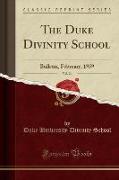- Start
- The Duke Divinity School, Vol. 24
The Duke Divinity School, Vol. 24
Angebote / Angebote:
Excerpt from The Duke Divinity School, Vol. 24: Bulletin, February, 1959
Graduation again calls us together. Other graduations will claim each of us, all our lives. May all of them, like this one, be within, not from, the Christian community.
What I say tonight is not a sermon. It is certainly no lecture. Most of you are beyond lectures at last, free of all sermons, save your own. Call this a poetic fantasy if you wish, perhaps a set of parabolic musings. No matter. I hold it simply an affirmation of faith. The development of it is not for me to argue, but for each of us to sustain or reject throughout our subsequent careers.
Listen to my assumptions with charity, and I'll state them with brevity. They are four: First, the Christian community is basically collegial, second, it is infinitely graduated, third, it is profoundly ecumenical, fourth, it is confidently stable.
I
First, then, the Christian community is basically collegial. In pre-Christian times a collegium was not primarily an educational institution. It frequently had religious functions. It was basically a guild or universitas. As such, it might be a burial society, an association of Roman priests, or a volunteer fire company. Collegians, again, might be gravediggers, worshippers or panhandlers.
The Christian college, in its emergence, built upon the connotations of mutual assistance already prevalent in Graeco-Roman clubs. New expressions of uncalculating helpfulness soon came to characterize these communities of Christ-following. Gradually, the term college assumed the character of reciprocating love, exercised within the sphere of edifying Christian instruction.
The first Christians were true collegians, that is, they were guild members of that agape which is in Christ. As collegers of Christ, they were students of the great Master. Pages of Latin-Christian etymology witness to the accretion of meanings in later history acquired by the word collegium. College might, for instance, betoken an association of monks or a body of cardinals. Increasingly, it emphasized the welding of intellectual discipline in a close-knit community of religious dedication.
About the Publisher
Forgotten Books publishes hundreds of thousands of rare and classic books. Find more at www.forgottenbooks.com
This book is a reproduction of an important historical work. Forgotten Books uses state-of-the-art technology to digitally reconstruct the work, preserving the original format whilst repairing imperfections present in the aged copy. In rare cases, an imperfection in the original, such as a blemish or missing page, may be replicated in our edition. We do, however, repair the vast majority of imperfections successfully, any imperfections that remain are intentionally left to preserve the state of such historical works.
Folgt in ca. 5 Arbeitstagen

